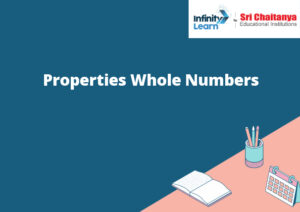Table of Contents
Properties of Whole Numbers
Properties Whole Numbers: A whole number is a number that can be divided evenly by one and itself. For example, the whole number 12 can be divided evenly by 1, 2, 3, 4, 6, and 12. The whole number 18 can be divided evenly by 1, 2, 3, 6, 9, and 18.

What is a Whole Number In Maths?
In mathematics, a whole number is a number that can be expressed as a natural number (1, 2, 3, 4, 5, 6, 7, 8, 9, 10, 11, 12, 13, 14, 15, 16, 17, 18, 19, 20, 21, 22, 23, etc.), without a fractional or decimal component. For example, 10, 21, and 34 are whole numbers, while 0.5, 1.5, and 2
Properties of Whole Numbers with Examples
A whole number is a number that can be divided evenly by two without a remainder. The whole numbers are 1, 2, 3, 4, 5, 6, 7, 8, 9, 10, 11, 12, 13, 14, 15, 16, 17, 18, 19, 20, 21, 22, 23, 24, 25, 26, 27, 28, 29, 30, 31, 32, 33, 34, 35, 36, 37, 38, 39
Properties of Addition and Multiplication
Addition and multiplication are two of the most basic operations in mathematics. They are also two of the most important operations, because they used in so many other operations.
Addition is the operation of combining two or more numbers to get a new number. The new number is the sum of the numbers that added. For example, if you add 2 and 3, the result is 5.
Multiplication is the operation of combining two or more
Properties of Subtraction
Subtraction is the inverse of addition. That is, it is the process of removing elements from a set. The most basic form of subtraction is taking away one object from a set of two objects. For example, if you have three apples and you eat one, then you have two apples left.
Subtraction can also used to calculate the difference between two numbers. For example, if you want to find out how many dollars you have left after spending ten,
Properties of Multiplication
Multiplication is the process of repeated addition. It is the most basic operation in arithmetic. Multiplication can thought of as scaling a number by a certain factor. The product of two numbers is the result of multiplying the numbers together. Multiplication is associative, meaning that the order of operations does not affect the result. For example, 3 multiplied by (4 multiplied by 5) is the same as (3 multiplied by 4) multiplied by 5. Multiplication is
Properties of Division
A property of division is that it always leaves a remainder. For example, if you divide 10 by 3, the result is 3 with a remainder of 1. This is also true for larger numbers. For example, if you divide 1,000 by 10, the result is 100 with a remainder of 0.
Fun Facts about the Philippines
Some fun facts about the Philippines are that it made up of over 7,000 islands, the largest of which is Luzon. The capital of the Philippines is Manila. The official language is Filipino, which is based on Tagalog. The population of the Philippines is over 100 million. The Philippines is a democracy and the president elected by the people. The Philippines is a member of the United Nations.
Solved Examples
A set is a collection of unique objects. The objects in a set called elements or members of the set. Sets can described in many ways including by listing their elements, by giving a rule that determines whether an object is in the set, or by describing a property that all elements of the set share.
One example of a set is the set of all natural numbers less than 10. This set can described by listing its elements: 1, 2, 3
Definition of a Whole Number
A whole number is a number that can divided evenly by two without a remainder. Whole numbers include the counting numbers 1, 2, 3, 4, and so on, as well as the number 0.
Natural Numbers
Mathematics is a science that deals with quantity, structure, space, and change. It evolved from counting, measuring, and describing the shapes of objects. One of the most fundamental concepts in mathematics is the natural number.
A natural number is a whole number that is greater than zero. It can identified by counting the number of objects in a set. The natural numbers are 1, 2, 3, 4, 5, 6, 7, 8, 9, 10,
Formal Definition
A formal definition is a precise and explicit statement of the meaning of a word or concept. A formal definition is based on a stipulative definition, which is a type of definition in which the definer stipulates the meaning of the defined term. A stipulative definition created for the purpose of a particular discussion or argument, and not necessarily intended to permanent or universal definition.






